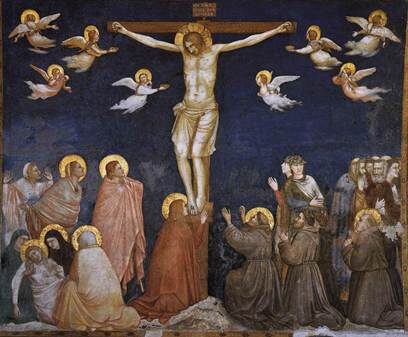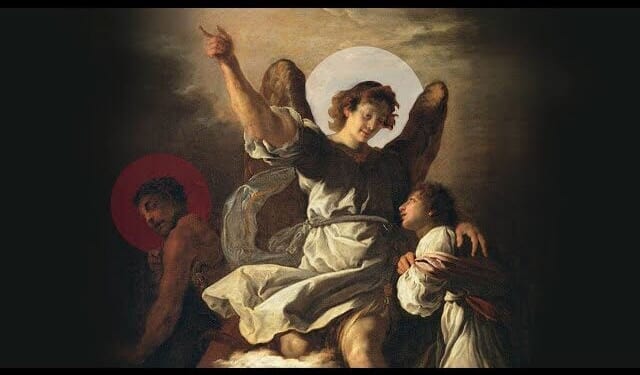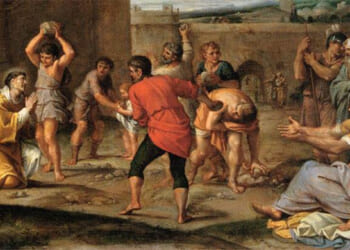I know I have a guardian angel
Call me old-fashioned, but I know I have a guardian angel.
I know it because I escaped a man who wielded a knife on a bus in Berlin.
I know it because I survived a 120-mile-an-hour cab ride during a torrential downpour in Madrid.
I know it because I looked the wrong way while crossing a street in Hong Kong and barely missed getting hit by an oncoming truck.
I know it because I foolishly bent down to pick up a baseball in the batting cage without turning the pitching machine off, barely avoiding an 85-mile-an-hour fastball that whizzed by my head.
If I were a pagan, I’d attribute those near misses to fate. If an atheist, luck. As it is, though, I am Catholic, so not only do I believe that God protects me, but that he has assigned a spiritual “envoy” (angelos in Greek) as my personal protector.
The Historical Evidence
Historical evidence for the belief in guardian angels can be traced back to the fourth century, but more importantly, it is rooted in Jewish scripture. Three “messengers” (malakh in Hebrew) visited Abraham near the terebinth trees in Mamre to confirm that his wife Sarah would bear a son (Gen. 18). Another angel suddenly appeared to stop him from sacrificing his son Isaac, reaffirming God’s blessings on his lineage in the process (Gen. 22).
The archangel Raphael acts as guide and protector to Tobias, using a fish to heal the blindness of his father Tobit. An angel comes to aid Daniel after King Darius throws him into the lions’ den (Dan. 6). Cherubim guard the Ark of the Covenant (Ex. 25) and Seraphim attend God’s throne, rending Him ceaseless worship and praise (Is. 6:1-7). We are privileged to echo their cry before the priest begins the Eucharistic Prayer: “Holy, Holy, Holy Lord God of hosts.”
Autumn Tradition
Autumn is a time when we remember these spiritual beings in a special way as we celebrate the Feasts of the Archangels on September 29th and of the Holy Guardian Angels on October 2nd.
On the surface, these celebrations seem peripheral to the Christian faith. But they’re not.
The reason is that they remind us of an inseverable connection to the immaterial world. If we call to mind our guardian angel each day, we remind ourselves that the universe is more than what we see with our eyes. They remind us that God’s protection over us is not from a distance, even though—strictly speaking—there is no “distance” in the immaterial world.
But that’s precisely the point. Because the immaterial world occupies no space, it’s everywhere. Its perfection will be experienced only in the world to come, but it already breaks in every day because of God’s redemptive work in Christ.
Angels and the Saints
Some saints, such as Sister Faustina, are graced with an extraordinary experience of that immaterial world in the present material world. “Today, in spirit, I was in heaven,” she writes in her diary, and continues:
. . . and I saw its inconceivable beauties and the happiness that awaits us after death. I saw how all creatures give ceaseless praise and glory to God. I saw how great is happiness in God, which spreads to all creatures, making them happy, and then all the glory and praise which springs from this happiness returns to its source, and they enter into the depths of God, contemplating the inner life of God, the Father, the Son, and the Holy Spirit, whom they will never comprehend or fathom.
Angels help us fathom the unfathomable inner life of God by reminding us that He has created something astonishing: spirits are like us in that they are intellectual, but unlike us in that they are immaterial. They are the crowning jewel of God’s creative power, and, as scripture teaches, they commune with us to remind us that we, they, and all creatures are directed toward God’s glory.
The awe we experience in their presence is not a one-way street. Because the Son of God became flesh, the angels admire us as much as we admire them. Jesus suffered in the flesh, something angels cannot do. And His suffering in the flesh allows us to participate in His sufferings in a way the angels cannot. This led Sister Faustina to write that “angels might envy the human capacity for suffering for God’s sake.”
Our fleshy existence also allows us to partake of Holy Communion, something the angels cannot do. “If angels could be jealous of men,” said St. Maximilian Kolbe, “they would be so for one reason: Holy Communion,” as this allows a unique intimacy with God that pure spirits cannot enjoy.
Angels, Popes, and the Mass
Our participation in the Holy Eucharist—and the presence of the angels at the altar during Mass—reminds us that faith itself is communal, so devotion to our guardian angels should be so too. It would be selfish of me to focus solely on how my guardian angel “saved” me when my life was threatened by a knife, a crazed cabbie, an oncoming semi, or a blazing fastball. Rather, those experiences remind me that I am part of a Church, both visible and invisible, the Body of Christ, in which I am called to help others through my works of charity and intercessory prayer. A day doesn’t go by when I beg the help of my children’s guardian angels as much as mine.
Lest we marginalize the belief in angels as secondary to our faith, St. John Paul II reminds us that “the angels, as pure spirits, not only participate in the holiness of God himself, in the manner proper to them, but in key moments they surround Christ and accompany him in the fulfillment of his salvific mission in regard to mankind” (General Audience, 30 July 1986).
Nowhere is this more stunningly presented than in the crypt of the Basilica of Saint Francis in Assisi, where Giotto has painted angels surrounding the crucified Christ, mourning his death with tears, rendering their garments in grief, and collecting the sacramental blood flowing from his wounds. The fourteenth-century master depicts the angels just as “present” at the scene as the mortal figures gathered at the foot of the Cross.

Pope Benedict XVI joined St. John Paul in speaking frequently of our guardian angels, quipping after an accidental fall that his guardian angel protected him but allowed him to break his wrist so that he would humbly spend more time in prayer. He, one of the greatest twentieth-century theologians, was also one of the most ardent practitioners of devotional piety, teaching that “from the beginning until the hour of death, human life is surrounded by (the angels’) constant protection” (Angelus, 2 October 2011).
Prayer to Your Guardian Angel
If you have grown slack in devotion to your guardian angel, perhaps you can rekindle it by learning one of the simplest and more beautiful prayers in Latin:
Angele Dei,
qui custos es mei,
me tibi commissum pietate superna,
illumina, custodi, rege, et guberna.
Amen.
Angel of God, my guardian dear,
to whom God’s love commits me here,
ever this day be at my side,
to light and guard, to rule and guide.
Amen.
Pray it when you wake up. Pray it before you go to bed. Teach it to your children as their first lesson in Latin. I guarantee you they will never forget it, just like their guardian angels will never forget them.
Image from Wikimedia Commons











